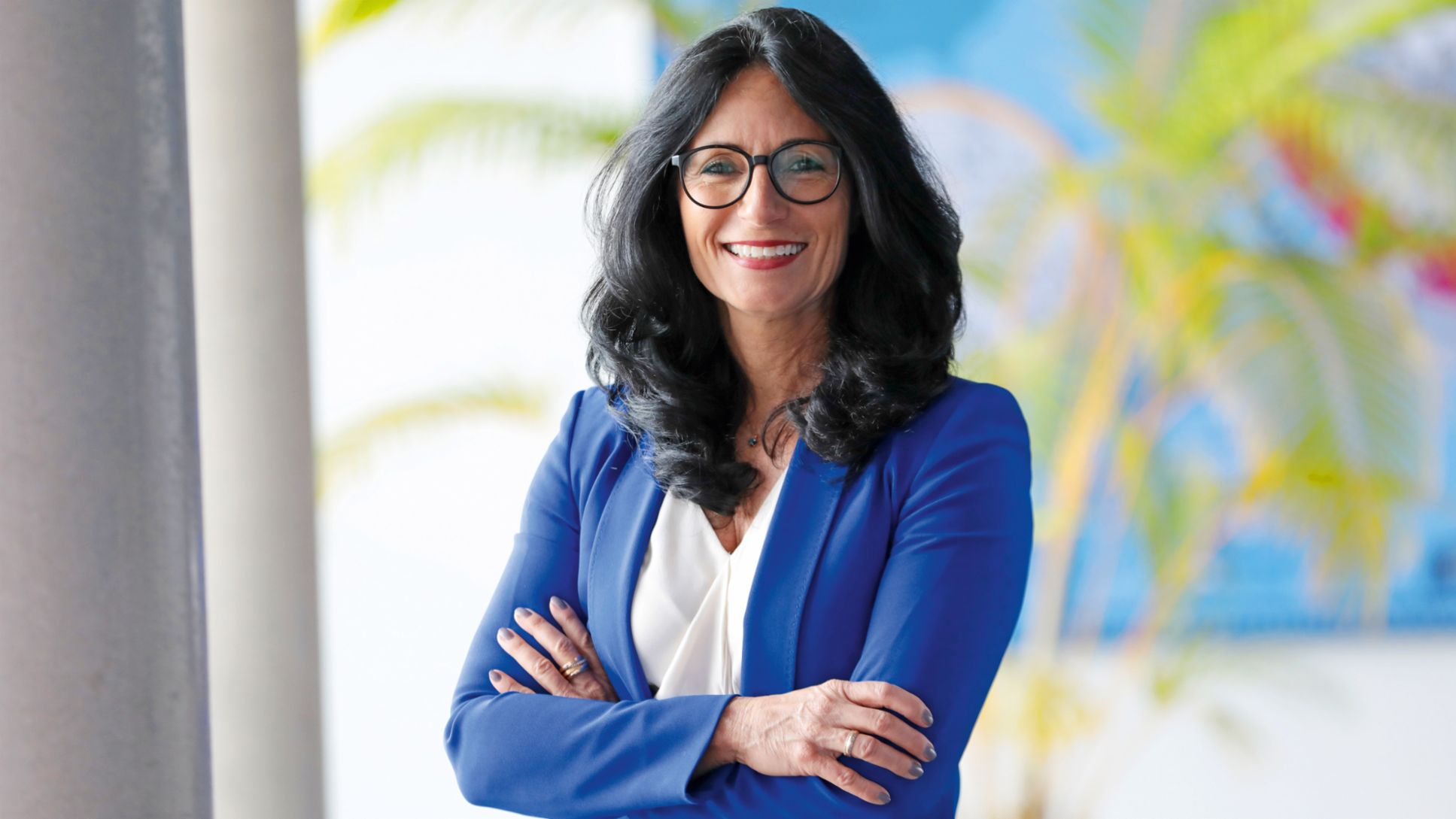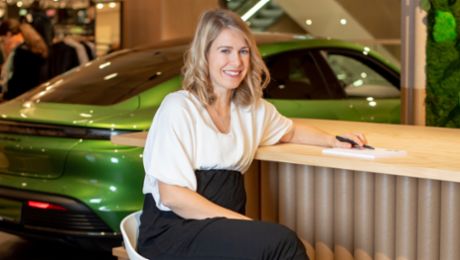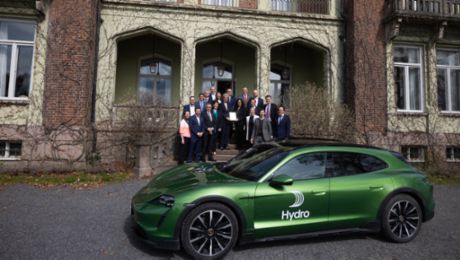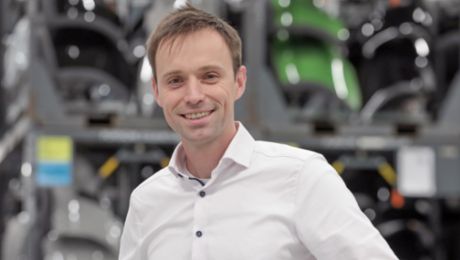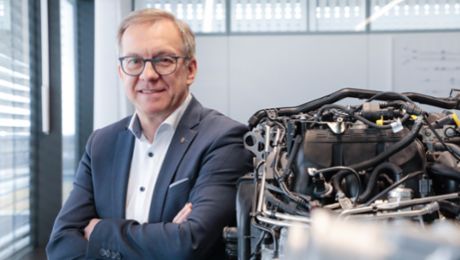Ms Frenkel, the first pilot facility for the production of eFuels has been up and running for about half a year now, following the grand opening in December 2022. How has it been going so far, and how important is this facility when it comes to producing synthetic fuels on a large scale?
Barbara Frenkel: The pilot facility in Punta Arenas, Chile, is starting up slowly but surely and is producing the first sustainable fuel. We’re proud of our innovative project and view ourselves as pioneers. There has never been a facility like this of this scale. The technology is highly complex. Our aim is to prove that eFuels can be sustainably produced on an industrial scale with the interlinked process.
Porsche is one of the pioneers in the development of eFuels, which are a controversial issue in current discussions. What makes this development such a good idea, and what potential do you see in eFuels?
Frenkel: We view ‘double E’ as a key element of sustainability and prioritise electric mobility. We’re making every effort to ensure that more than 80 per cent of our new vehicles feature an all-electric drive by 2030, which makes us a pioneer in our industry. And eFuels are then of course a sensible complement, as they can help decarbonise transportation with immediate effect. We’re thinking of our existing fleet, in particular. In other words, all of the Porsche cars with a gasoline engine that are already on the road – and will continue to be for a long time to come.
There are some who claim that Porsche only promotes eFuels in an effort to save the internal combustion engine of the 911. What do you say to them?
Frenkel: One thing is clear: the 911 will be the last Porsche model with an internal combustion engine. And we see great potential in eFuels, as there are currently more than 1.3 billion cars with an internal combustion engine worldwide, for which synthetic fuels offer sustainable prospects. In other areas, too, eFuels can offer a sensible solution, such as airplanes and ships.
What conditions do you think are necessary for producing eFuels?
Frenkel: Of course it only makes sense to produce eFuels in regions where renewable energy is available in large quantities. These are then stored in eFuels, which can be transported to locations with high energy requirements. That’s the case in southern Chile, where wind energy is constant and in abundant supply. The location has no industry, very few cars, and limited civilisation, which is why eFuel production makes sense there.
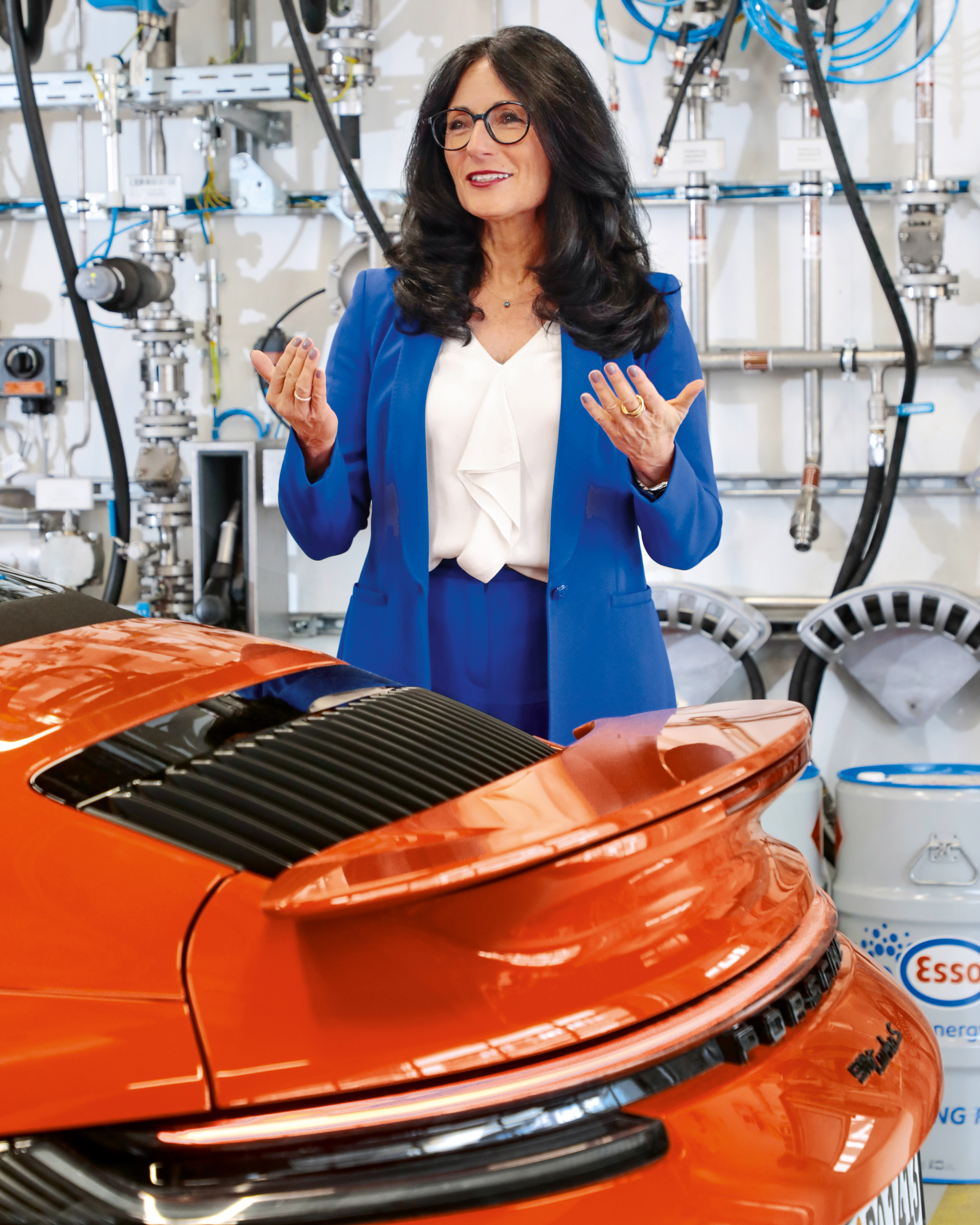
Sustainability, electric mobility, and digitalisation – changes can be felt in just about every aspect of life. How does Porsche go about managing these changes responsibly?
Frenkel: We’re witnessing a monumental change in the automotive industry. And we will experience more changes in the years to come than we have over the past 50 years. “It is not the strongest of the species that survive, nor the most intelligent, but rather the one that is most prepared to change,” Charles Darwin once said. At Porsche, we view change as an opportunity. Although it sounds simple, it can actually be quite challenging. When it comes to the transformation, we focus on what’s important, on what has always made us strong. What forms the core is the powerful brand, our emotionally charged products, and our most important resources, which are the people – our employees – who promote change with passion and a pioneering spirit. A forward-looking strategy, strong partners, and a robust business model form the basis.
You often emphasise that sustainability is a matter dear to your heart. Why is this topic so important to you personally?
Frenkel: Sustainability has shaped my life in many ways. For me, sustainability is a principle, an attitude based on values. It’s about thinking things through, from start to finish. I’m also fascinated by the complexity of sustainability. At Porsche, for example, sustainability has multiple dimensions, including environmental, social, and economic. Covering these areas, making the right decisions, and winning over our partners are all exciting tasks and a new challenge day after day for me and my team.
The past two years have seen significant delivery issues and material shortages, due in part to the coronavirus lockdown in China and the Ukraine crisis. What have these experiences taught you?
Frenkel: Our supply chains are global and complex and therefore not every eventuality is foreseeable. But you can learn from every problem – and I’m always looking to the future. What’s important now is making our supply chains more flexible, which we can do with a variety of measures. But there’s no turning back globalisation.
With the general public paying more and more attention to the supply chain as a whole, what in particular do you need to think about? And which values play an indispensable role also in terms of Porsche Strategy 2030?
Frenkel: I enjoy promoting our sustainability strategy as a mentor with my fellow Executive Board member Albrecht Reimold. Procurement plays a key role, as Porsche purchases many components from external suppliers. We work together to develop innovative solutions for our vehicles that are even more sustainable. We cannot increase climate protection without our partners and want to include them on our journey to carbon neutrality in 2030.
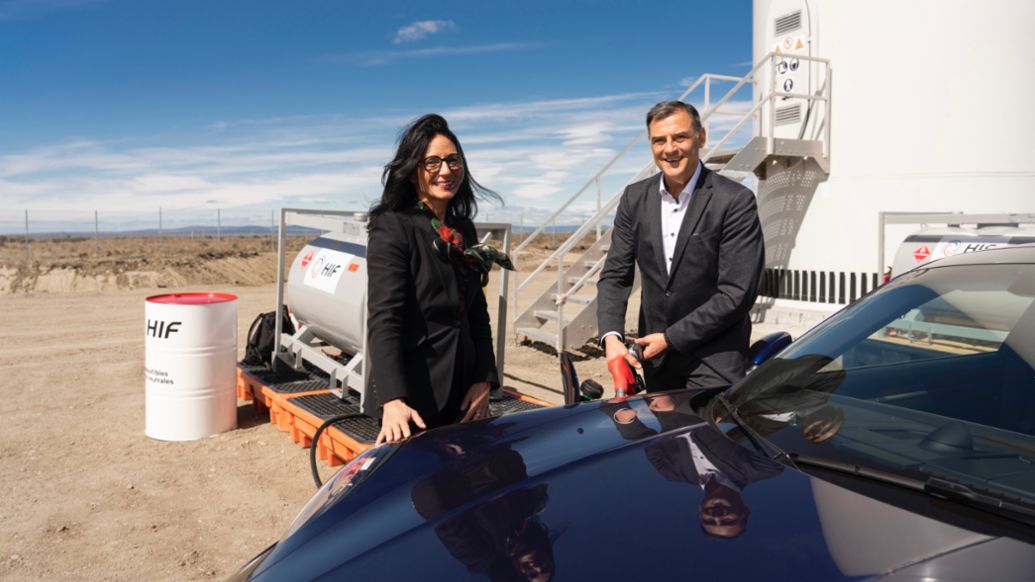
What can you do to preserve Porsche values throughout the entire supply chain?
Frenkel: Values and respect are important across the board. For me, that means we treat people well, and Porsche promotes fair working conditions throughout the entire supply chain, from parts suppliers to the mining of raw materials. It’s important to make supply chains as transparent as possible, which is why we’ve put together a strong team of experienced experts. Employees use artificial intelligence to monitor the supply chain and identify potential risks early on. Our partners are also required to observe internationally recognised sustainability standards. This has been a prerequisite for doing business with Porsche for several years now.
Does a company like Porsche, which acts as a role model due to its products, need to be a trendsetter in responsible transformation?
Frenkel: Electric mobility has taught us an important lesson. When it comes to new technology, you need to get the timing right, which is exactly what Porsche did. We introduced electrification in our products very early on and in 2015, we decided to move our Mission E concept study into series production. The Taycan, our first all-electric sports car, is now a great success. The consistent step to electric mobility was right for Porsche. We’re promoting the transformation out of conviction. And that makes us happy to be a trendsetter.
Values such as sustainability and credibility are increasingly central issues for young people. How do you appeal to younger target groups and still preserve traditional values?
Frenkel: My understanding of sustainability has evolved over the years, just as perception has changed in society. Because today, sustainability is a basis for success in business life. And thank goodness for that. Sustainable operations are more than just a trend that motivates people around the world. They want to connect and identify with the brands that reflect their own values. Climate action, in particular, is everyone’s business. Each and every contribution counts, including our efforts to conserve resources.
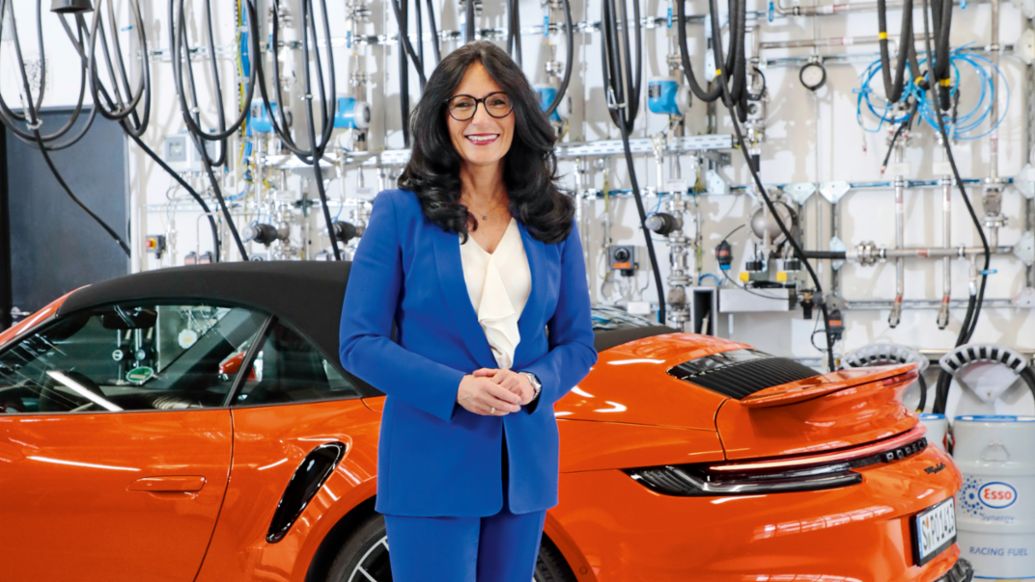
Diversity plays an increasingly important role at companies. What does that look like to you?
Frenkel: For me, diversity represents a variety of perspectives. We need people with different types of experience, which is why we want to win over more women for Porsche. But we’re also looking for people from different industries or with an international background. A major change has taken place in management. We appreciate the significance of diversity. Mixed teams can sometimes be stressful, as not everyone thinks and acts in the same way. But they make solutions more innovative and help move the company forward. I think it’s exciting to work in teams like that.
Women currently make up 37 percent of your Procurement staff. You’re interested in increasing that number and creating the conditions that will allow women to assume more responsibility. What are those conditions exactly?
Frenkel: I’m interested in providing more women with opportunities. It’s about becoming visible and assuming responsibility. But one thing is clear: Porsche is a sporty brand – as is our team. You have to demonstrate performance and commitment regardless of your gender. I like seeing people develop professionally and achieve success. I can also be of help as a mentor. I’m the only woman on the Executive Board – and therefore a role model for other women.
“I’m proud of just how well our team works together.” Barbara Frenkel
You’d already had a successful career with suppliers when you took the next step and joined Porsche in 2001. What was it about the company that appealed to you?
Frenkel: The agility. The flexibility. And of course the products. Even back then, Porsche was already a well-respected and highly coveted brand. Porsche is always reinventing itself and never rests on its laurels. That’s a good fit for me. This dynamism motivates me every day to do my very best with my team.
Does your own passion for Porsche sports cars also play a role?
Frenkel: Of course. My brother had a silver 993 Carrera 2 with an air-cooled engine. A beautiful car. The driving dynamics were unbelievable and the first time I sat in the passenger seat was an important experience for me. The start of my passion for Porsche. I thought to myself, I’d like to drive a sports car like that at some point in my life. The 911 has always fascinated me. I still drive one to this day.
Who has had the biggest influence on you?
Frenkel: My parents. They passed on their values to me and have always been supportive. I wouldn’t be where I am today without my parents.
We talked about how times were difficult when you began your work on the Board. What are the achievements you’re most proud of so far?
Frenkel: It’s true. We live in challenging times. I was appointed to the Board during the coronavirus crisis. And then there’s the war in Ukraine, which comes with its own challenges. There was also a shortage of semiconductors. And sudden interruptions in supply chains are a common occurrence. But there are also opportunities in every crisis. We put our supply chains to the test and made adjustments where necessary. I’m proud of just how well our team works together. And the results speak for themselves. Despite the difficult circumstances, we achieved a new record in the number of vehicles delivered in 2022.
What’s your life motto?
Fenkel: Life’s too short to be in a bad mood.
Info
Text first published in the Porsche magazine Christophorus.
Author: Peter Gräve
Photos: Christoph Bauer
Copyright: All images, videos and audio files published in this article are subject to copyright. Reproduction in whole or in part is not permitted without the written consent of Dr. Ing. h.c. F. Porsche AG. Please contact newsroom@porsche.com for further information.
